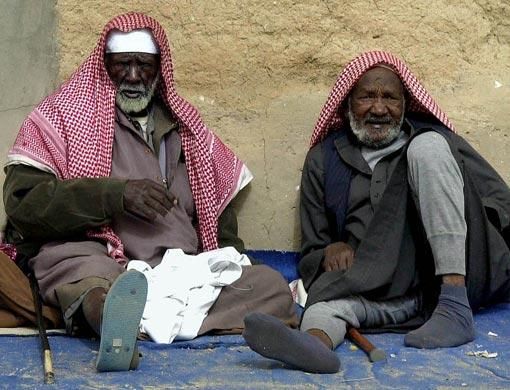Dubai: No government in the world can eradicate poverty because part of the problem stems from behavioural and social attitudes, according to Dr Hatoon Al Fasi, assistant professor at the King Saud University, who made her comments on a documentary bout poverty in Saudi Arabia broadcast on the internet.
However, she also stressed that there are no excuses for a government like that of Saudi Arabia, which witnesses the problem of poverty increasing in its own nation, while it maintains a position as one of the world's top world donors when compared to its Gross Domestic Production (GDP).
Saudi Arabia spends more than 4 per cent of its total GDP annually on donations and humanitarian aid that reaches people in more than 110 countries around the globe. At the same time, nearly 30 per cent of its own nationals suffer from poverty.
The UN recommends that rich countries should donate a minimum of 0.07 per cent of their GDP for aid and humanitarian projects, which many industrial countries around the world fail to manage, while Saudi Arabia is exceeding the minimum ceiling by 600 per cent.
However, Dr Al Fasi said the only positive change over the past seven years is that of lifting the taboo of discussing the problem in the media and political arenas.
Key visit
"The lifting of the taboo of the poverty dossier in the country came after the visit of the King Abdullah Bin Abdul Aziz Al Saud to two of the poorest districts in the Saudi capital, Riyadh, in November 2002," said Dr Al Fasi.
Following the courageous visit, the then crown Prince Abdulah said: 'Seeing the reality [of poverty] is not like hearing about it. There is a need to step out of offices in order to address the problem. The problem of poverty will not be solved by applying haphazard solutions'.
A few months later, in February 2003, King Abdullah formed a National Charity Fund with a total capital of SR10 billion (Dh9.7 billion) to eradicate poverty in the kingdom. The fund was one of the multi-aspect policies set by the Saudi Monarch to addressing the problem.
"The fund has made no impact on the problem of poverty in the country," said Dr Al Fasi. "The problems have in fact deteriorated over the past two years due to negative economic development including the collapse of the stock market and the speculation on land meant for housing projects. Poor and middle income citizens in Saudi Arabia have lost any hope in living a respectable life."
She said a lot of middle income people had lost all their savings in the bourse while unemployment becomes a general phenomenon.
Government Statistics issued last month showed little improvement, from 11.2 per cent to 9.8 per cent, but researchers believe that unemployment is as high as 25 per cent in the oil rich country.
Dr Al Fasi said in spite of the generous anti-poverty fund set by the king, noone could claim that Saudis are better off today.
She said the Commercial building watchman in the documentary is just one of hundreds of thousands of Saudis who are living below the poverty line.
According to an academic study by Dr Rashid Bin Sa'ad Al Baz, Saudis who earn equal or less than SR1660 (excluding housing) are considered poor and those who earn below SR1200 are below the poverty line.
"Thirty per cent of Saudis earn less than SR 1660 and thousands of them like Ahmad, the watchman, earn less than SR 1200," said Dr Al Fasi. "Around half of all Saudi families don't own their homes, with a considerable percentage of them living in shanties like those whom King Abdullah visited six years ago," she said.
Dr Aziza Al Nuaim, a professor at the King Saud University in Riyadh who specialises in poverty studies, said the picture of poverty in Saudi Arabia is bleak but there is some hope in a solution if proper measures are taken.
She said part of the poverty problem lies with values instilled in young generations through the education process while another part lies with social norms that rich people are the only people are the ones who should fight it.
"I lived with a poor family in the outskirts of Riyadh for about 8 months to conduct a study about the problem," said Dr Al Nuaim.
"The findings were astonishing due to the poor level of management of income shown by some poor families. I am sure that families living in shanties and old houses in the Manfooha and Al Oud areas are very poor and earn little regular income, but the way those families tend to spend donations and alms given to them by rich people raises a question mark on the feasibility of the donations as a system to alleviate poverty," she said.
Poor management
"Some families who lack the very basic necessities for modern life might spend all the donation money on buying an expensive set of mobiles or a new TV set when they don't have a hygienic toilet," Dr Al Nuaim explained.
"There is a strong tendency by poor people to imitate rich people's behaviour whenever they get their hands on extra resources and that has a catastrophic impact on their lives.
Rich people, not only in Saudi Arabia but in different Arab societies, need to lessen their showy lifestyles and educators should pay special attention to setting genuine priorities in the minds of youths instead of leaving room for commercial advertisements to set the priorities of poor people.
"Poor people are vulnerable and have very little immunity against such impressions and government programmes aimed at addressing the problem should not ignore the psychological side of poverty," she said.










